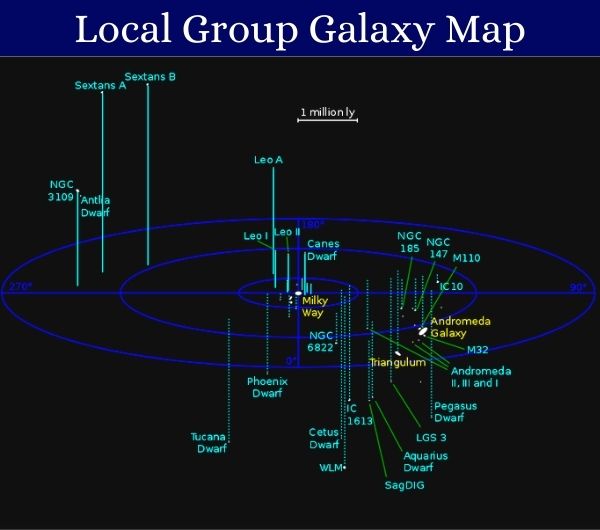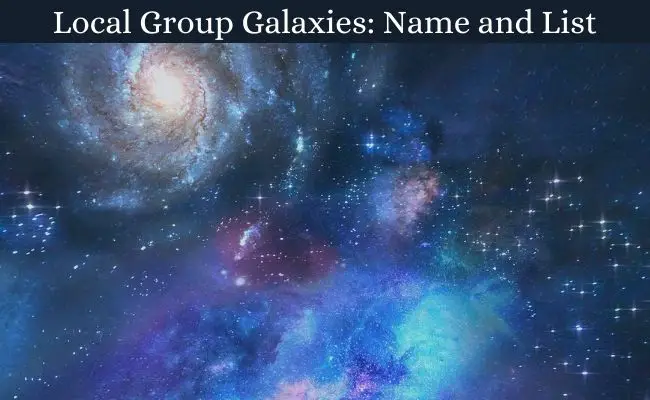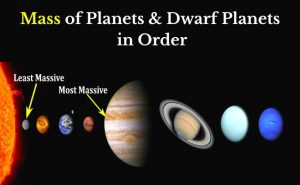The Milky Way is the galaxy where our Earth exists. Our Milky Way exists in a group of galaxies and these all galaxies are called Local Group Galaxies. So, Local Group (LG) is a galaxy group where more than 50 galaxies exist with our Milky Way and Andromeda (neighbor galaxy).
Andromeda is the biggest and our Milky Way is the 2nd biggest galaxy in the Local Group. These large galaxies also have many satellite galaxies (it is like planets that have many satellites/moons). Most of these satellite galaxies are dwarf-type irregular galaxies. Check about:- Types of Galaxies
The local group galaxies made a shape like a “dumbbell”. Andromeda and its satellite galaxies form one side lobe of the dumbbell whereas Milky Way and its companion galaxies form another side of the dumbbell lobe structure.
How large is the local group?
Milky Way and Andromeda are the two largest galaxies in the local group. The approximate diameter of the Milky Way is around 150,000 light-years in diameter whereas the approximate diameter of Andromeda is around 220,000 light-years. It means if you travel with the speed of light (300,000 km/sec), you will take 150 thousand years to cross one side to another side of the milky way.
Read About:- 20 Special Facts About Milky Way Galaxy
So, how large is the local group? This group contains many galaxies, so definitely it would be very large. Let me tell you a fact about Local group galaxies. If you travel at the speed of light, you will take almost 10 million years to cross the local group from one side to another. It means the diameter of the local group is around 10 million light-years (9 × 1019 kilometers).
Local Group Galaxy Map
Below is the map of the local group (only mentioned some large and famous galaxies). The image source is taken from- http://www.atlasoftheuniverse.com/

Local Group Facts
- Andromeda with its companion and Milky Way with its satellite galaxies make a shape like a “dumbbell”. The distance between both the collection of galaxies is around 3 million light-years. According to scientists, they are moving towards each other at a speed of almost 123 km/sec. And in this way, they will collide in the future and create a newly combined galaxy.
- The Milky Way and Andromeda both are spiral-type galaxies.
- The third-largest member of the local group is Triangulum Galaxy.
- Pisces Dwarf is a type of irregular dwarf galaxy. It exists in the middle (equidistant) of Andromeda and Triangulum Galaxy, so it may be a satellite galaxy of both.
Must Check:- Andromeda Galaxy Facts and Information
Local Group Galaxies List with Name
The total number of galaxies in the local group is not known yet, though there may be more than 50 galaxies in the local group. The known galaxies list with their names and approximate diameter are mentioned below.
Andromeda and its satellite galaxy list in Local Group
- Andromeda (M31): Largest Galaxy in the Local Group (size – 220,000 ly)
- Messier 32 (M32/NGC 221): size – 6,500 ly
- Pisces Dwarf (LGS3)
- M110 (NGC 205) – 5th Largest Galaxy in Local Group
- NGC 147 (DDO 3)
- Andromeda III
- NGC 185
- Andromeda I
- Andromeda V
- Andromeda II
- Cassiopeia Dwarf (Andromeda VII)
- Pegasus Dwarf Spheroidal Galaxy (Andromeda VI)
- Perseus I Dwarf Galaxy (Andromeda XXXIII)a
Milky Way and its satellite galaxy list in Local Group
- Milky Way: Second Largest Galaxy in the local group (size – 175,000 ± 25,000 ly)
- Large Magellanic Cloud (LMC): Fourth largest member of Local Group (size – 14,000 ly)
- Small Magellanic Cloud (SMC) – 6th Largest in the local group
- Canis Major Dwarf
- Sculptor Dwarf (E351-G30)
- Fornax Dwarf (E356-G04)
- Carina Dwarf (E206-G220)
- Leo I (DDO 74)
- Sextans Dwarf
- Leo II (Leo B)
- Ursa Minor Dwarf
- Draco Dwarf (DDO 208)
- SagDSG (Sagittarius Dwarf Spheroidal Galaxy)
- Ursa Major I Dwarf
- Ursa Major II Dwarf
- Leo IV
- Leo V
- Leo T
- Boötes II
- Boötes III
- Coma Berenices
- Segue 2
- Hercules
- Pisces II
- Reticulum II
- Eridanus II
- Grus
- Tucana II
Other galaxies list in the Local Group
- Triangulum Galaxy (M33): Third largest galaxy in the Local Group (size – 60,000 ly)
- Wolf–Lundmark–Melotte (WLM, DDO 221)
- IC 10
- IC 1613 (UGC 668)
- Phoenix Dwarf
- Leo A (Leo III)
- Sagittarius Dwarf Irregular Galaxy
- Aquarius Dwarf (DDO 210)
- NGC 6822 (Barnard’s Galaxy)
- Pegasus Dwarf
- Boötes Dwarf Galaxy
- Cetus Dwarf
- Canes Venatici I Dwarf
- Canes Venatici II Dwarf
- KKs 3
- Tucana Dwarf
So, these were the name and numbers of known galaxies in the local group. Scientists are still searching, but the identification of some galaxies is not clear yet to include them in the list of Local Group Galaxies. The list will be updated whenever the number of galaxies increases in the local group.
Relevant Posts:-



